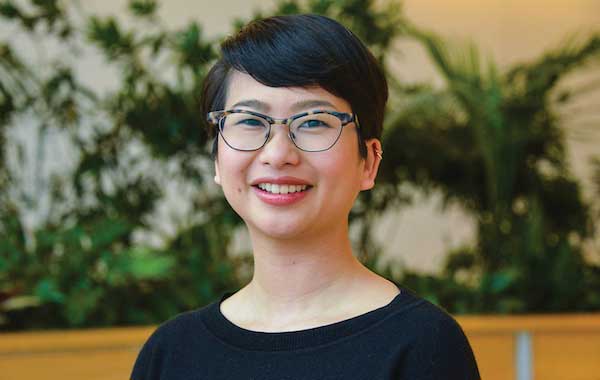Two Danforth Center Scientists Receive Prestigious Awards Recognizing Their Achievements And Leadership
ST. LOUIS, MO, March 11, 2021 – Two Danforth Center Principal Investigators were recently recognized with early career awards for outstanding achievement and leadership.
Andrea Eveland, Ph.D., associate member, received the Marcus Rhoades Early Career Award at the 63rd Maize Genetics Conference (MGC) for her research that mixes genomics, developmental biology, and advanced bioinformatics. The MGC Marcus Rhoades Early Career award recognizes an individual who has made significant research contributions through genetic studies of maize or related species, and has been in a permanent position for eight or fewer years.

Andrea Eveland, Ph.D., associate member at the Donald Danforth Plant Science Center
Eveland has been an active member of the MGC community for 18 years, the last six of which have been at the Danforth Center. Her research is focused on genetic control of plant architecture and regulation of abiotic stress response. Eveland leads a $3.4M National Science Foundation-funded project that leverages developmental biology, genomics, and quantitative genetics to dissect the molecular networks underlying tassel branching and leaf angle in maize, two important traits underlying yield. She also leads a $2.5M Department of Energy-funded project that integrates high-throughput phenotyping with genetics and genomics to identify novel loci for drought resilience in sorghum, a small grain cereal crop that is closely related to maize. Eveland has also been a major driver in establishing Setaria viridis as a model for developmental genetics, using it to make several key discoveries in plant architecture that can be translated back to maize and sorghum.
Eveland received her Ph.D. in 2008 from the University of Florida where she studied sugar signaling and drought physiology during kernel set in maize and was an early adopter of next generation sequencing technologies for quantifying gene expression in plants. In 2007, she gave her first talk at the MGC on 3’ transcript profiling in maize using 454 sequencing. In 2008, she received an NSF postdoctoral fellowship to train at Cold Spring Harbor Laboratory where she applied cutting-edge genomics and bioinformatics to address complex questions in maize developmental biology.
Malia Gehan, Ph.D., assistant member, received the 2021 North American Plant Phenotyping Network (NAPPN) Early Career Award at the NAPPN annual conference on February 19 in recognition of academic, outreach and leadership contributions made to the phenotyping community. The NAPPN Early Career Award highlights leaders doing novel research, increasing the visibility of plant phenotyping (peer reviewed publications, presentations, social media, popular press and service), supporting research between public and private sectors, and developing (or following) data standard best management practices and/or transdisciplinary engagement.

Malia Gehan, Ph.D., assistant member at the Donald Danforth Plant Science Center
The NAPPN is an association of scientists and researchers in the rapidly evolving area of plant phenomics, formed as a regional partner of the International Plant Phenotyping Network (IPPN). The Phenome conference represents a multidisciplinary community comprising plant biologists, ecologists, engineers, agronomists, computational scientists and representatives from U.S. federal agencies who come together in a rich and diverse networking environment to foster collaboration, innovation and the initiation of multi-investigator and multi-institution projects.
Gehan and team develop high-throughput phenotyping methods to identify natural variation of plants in response to temperature stress and to learn how plants interact with their environment. The Gehan lab focuses on mining natural variation for improved temperature stress resistance, which will help to improve crop productivity. The research also addresses basic questions of how plants perceive temperature. Interactions of plant genotype and the environment, especially stressful environments, are dynamic and can produce a multitude of phenotypes.
Gehan has been in her Principal Investigator role at the Danforth Center since 2016. Prior to that, she was a Postdoctoral Research Scientist at the Center funded by a NSF-PGRP Postdoctoral Fellowship, focusing her work on developing phenotyping tools. Gehan and colleagues started a Maker Group at the Danforth Center to develop low-cost phenotyping tools, and fun outreach events like the Raspberry Pi Jam. Gehan earned her Ph.D. in Plant Biology at Michigan State University, examining natural variation in freezing tolerance and the integration of the circadian clock with cold signaling. As an undergraduate researcher in Biology at Willamette University, she studied thermoinhibition of growth and development of guard cell protoplasts with Dr. J. Gary Tallman.
“We are so proud of Andrea and Malia, and for all that they have achieved in the plant science field,” said Jim Carrington, Ph.D., president and CEO of the Danforth Center. “They are outstanding, collaborative scientists and team leaders, and wonderful contributors to the Danforth Center community. We are lucky to have both of them here.”
About The Donald Danforth Plant Science Center
Founded in 1998, the Donald Danforth Plant Science Center is a not-for-profit research institute with a mission to improve the human condition through plant science. Research, education and outreach aim to have impact at the nexus of food security and the environment, and position the St. Louis region as a world center for plant science. The Center’s work is funded through competitive grants from many sources, including the National Institutes of Health, U.S. Department of Energy, National Science Foundation, and the Bill & Melinda Gates Foundation. Follow us on Twitter at @DanforthCenter.
Contact:
Karla Roeber
Vice President Public and Government Affairs
The Donald Danforth Plant Science Center
kroeber@danforthcenter.org